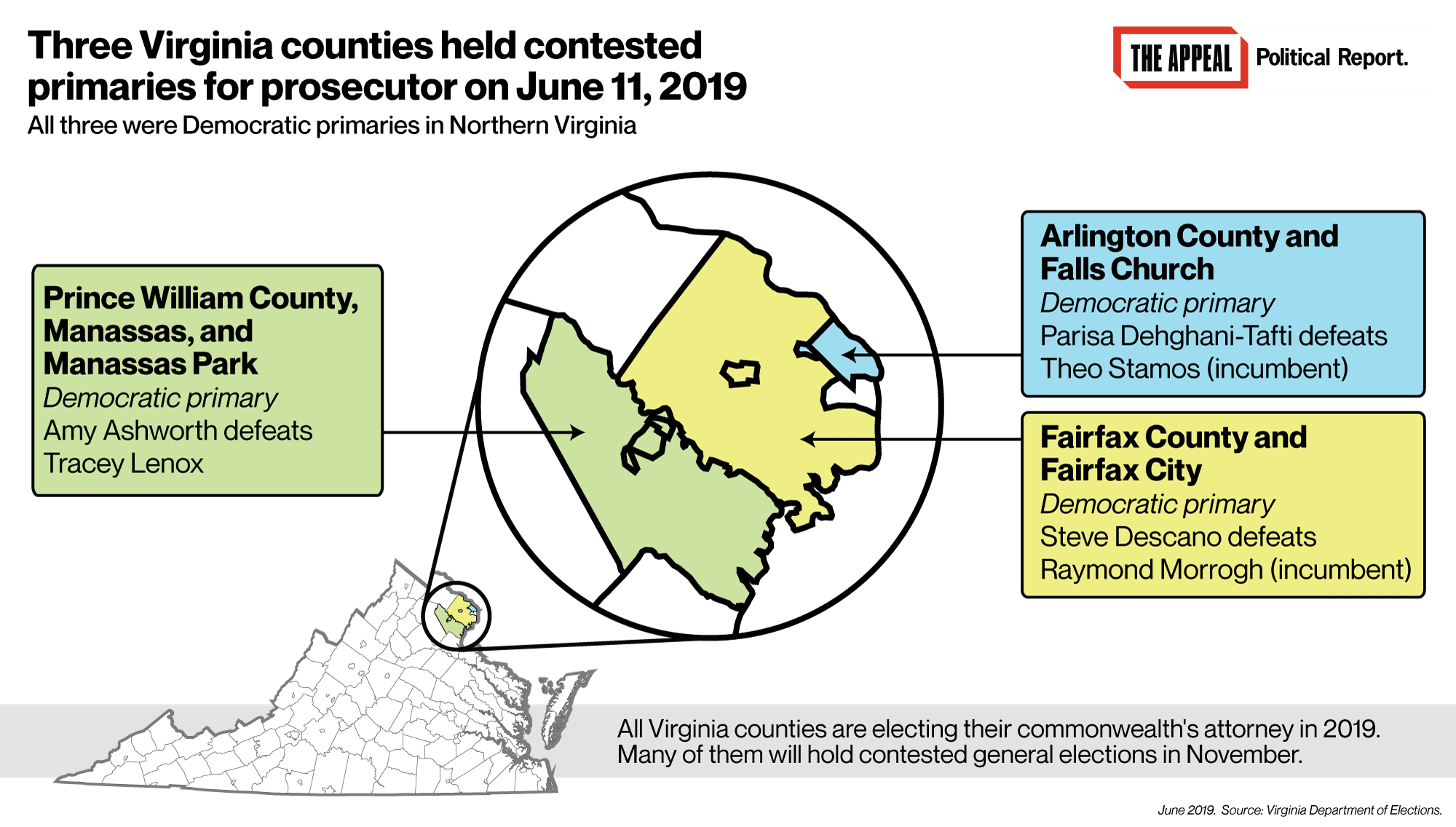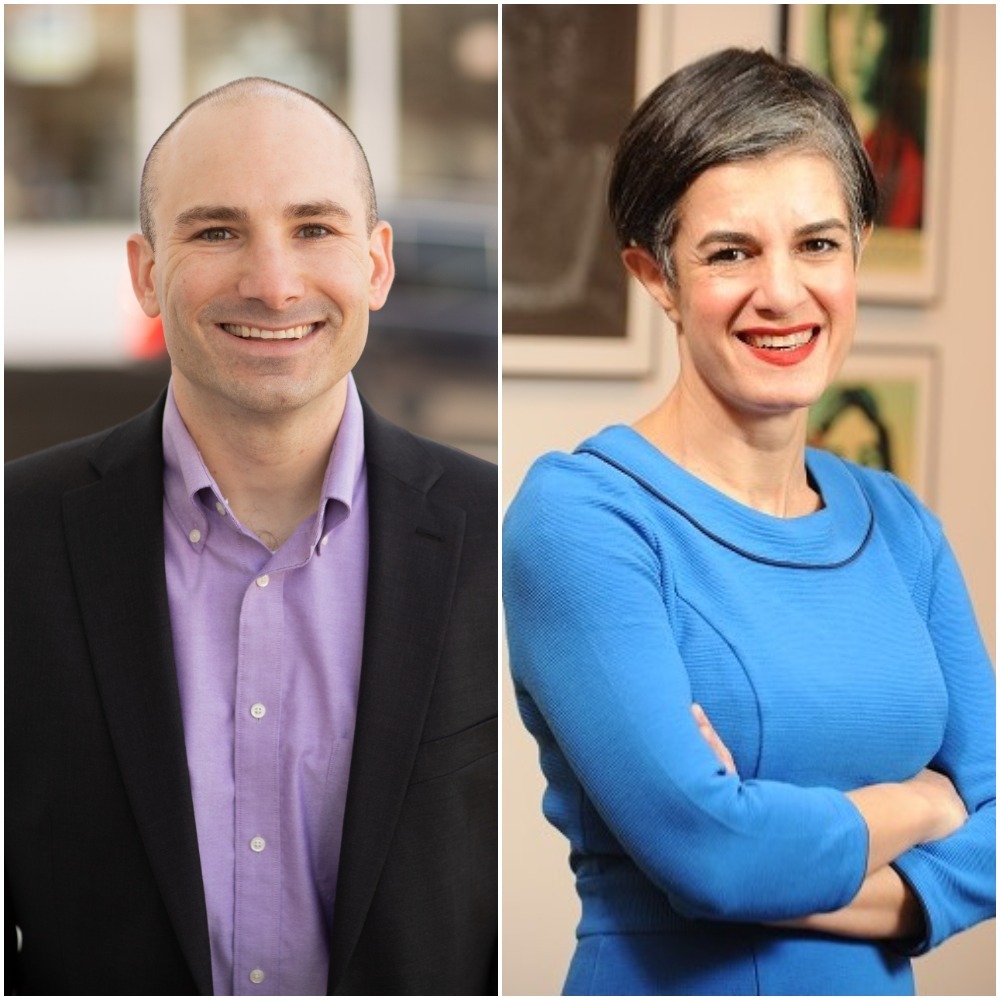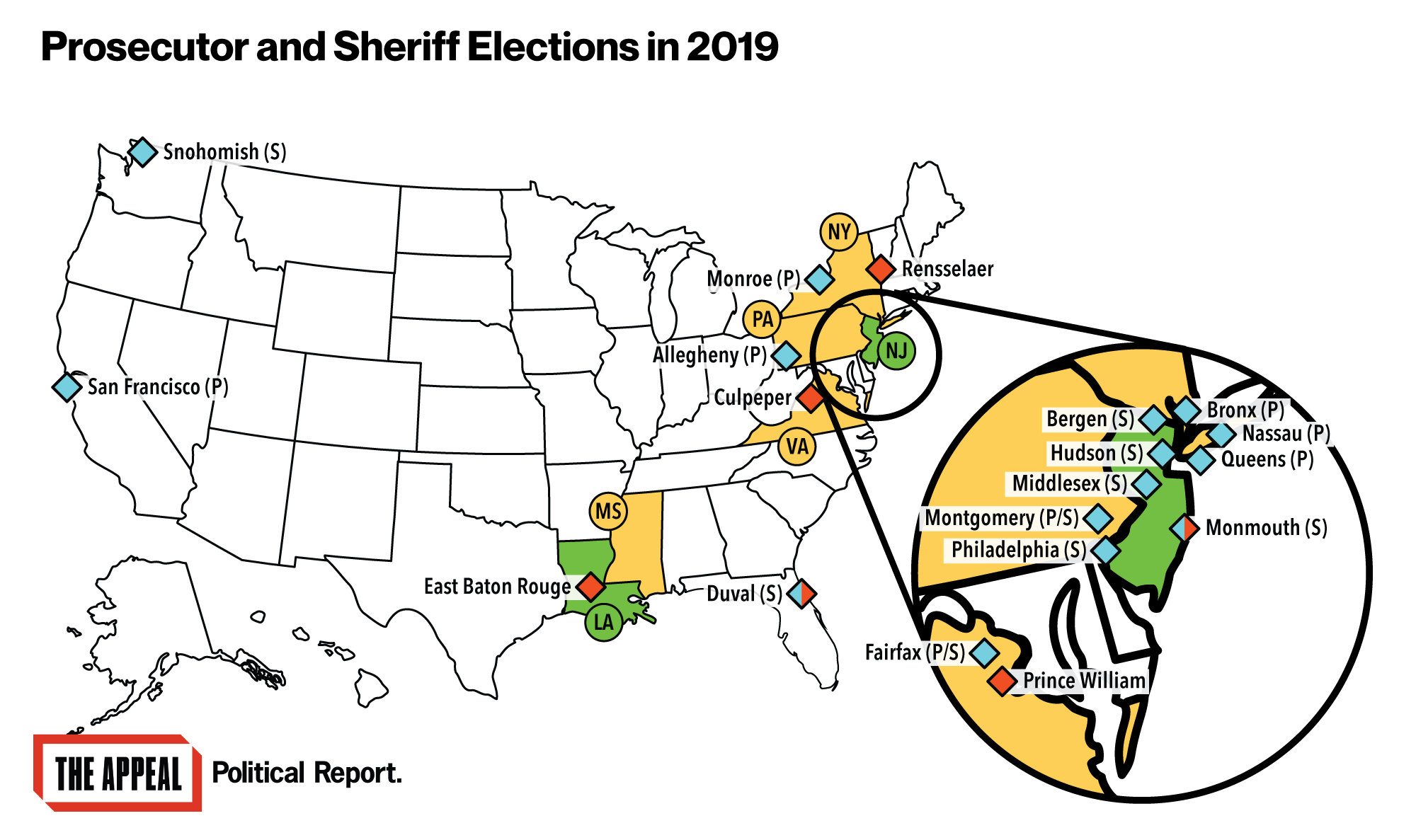Political Report
In Key Virginia Primaries, Winners Ran on Ending Mass Incarceration
Parisa Dehghani-Tafti and Steve Descano oust the chief prosecutors of Arlington and Fairfax counties, overhauling prosecution in Northern Virginia.
Parisa Dehghani-Tafti and Steve Descano oust the chief prosecutors of Arlington and Fairfax counties, overhauling prosecution in Northern Virginia.
Theo Stamos, the chief prosecutor of Arlington County, argued in 2018 that mass incarceration is an expression “used to delegitimize” what prosecutors do. “There isn’t a prosecutor in this country that engages in mass incarceration,” said Stamos, who has a history of harsh practices.
But voters in two populous Virginia counties, home to a combined 1.4 million people, signaled that they believe otherwise in Tuesday’s Democratic primaries.
They ousted Stamos and Ray Morrogh, her Fairfax County colleague, in favor of two challengers who campaigned on “ending” or “dismantling” mass incarceration.
Parisa Dehghani-Tafti, a former public defender and the legal director of the Mid-Atlantic Innocence Project, defeated Stamos in Arlington County and Falls Church. She is unopposed in the general election.
Steve Descano, a former federal prosecutor, beat Morrogh in Fairfax County and Fairfax City. In this Democratic-leaning jurisdiction, he faces Jonathan Fahey, who is running as an independent, in November’s general election. No Republican candidate filed.
These results prolong a tide of electoral success for candidates who ran for prosecutor looking to overhaul the local legal system. They include Larry Krasner in Pennsylvania, Satana Deberry in North Carolina, and Rachael Rollins and Andrea Harrington in Massachusetts.
“We give prosecutors so much discretion about how to resolve criminal cases,” Andy Elders, the director of policy development for Justice Forward Virginia, a nonpartisan political action committee, told the Political Report on Tuesday evening. “Tonight’s results are part of a nationwide movement in which voters are telling prosecutors that they want change. They want fewer people in jail. They want drug offenses to result in treatment, not jail sentences. They want to get mentally ill people out of jails. They want racial bias in this system to be addressed.” Elders is also the deputy public defender for Fairfax County.
The two challengers received considerable financial support from a political action committee funded by George Soros to promote criminal justice reform.
Reform-oriented platforms
In separate interviews with the Political Report, Dehghani-Tafti and Descano laid out how they would reform prosecution.
They both said that they would not seek the death penalty nor prosecute marijuana possession charges.
Both questioned why anyone would ever be denied voting rights over of a criminal conviction. “We should never forget that these laws are the vestiges of Jim Crow,” Dehghani-Tafti said. This made for a striking contrast given their opponents’ joint decision to jump on to a 2016 lawsuit against then-Governor Terry McAuliffe’s executive order restoring voting rights for people who complete their sentences. McAuliffe endorsed both of the challengers.
A core argument of Descano’s campaign was that prosecutors file excessively severe charges. “There is a cycle of decreased opportunity, increased poverty, increased crime. That’s what we want to break here,” he said, adding that he would file fewer felony-level charges and “create a presumption that any theft under $1,500 is treated as a misdemeanor.” (Virginia’s current felony threshold stands at $500.) He also faulted prosecutors for “reflexively” seeking high sentences, and said he would end cash bail and increase the use of pre-conviction diversionary programs.
Dehghani-Tafti told the Political Report that she ran for prosecutor to address mass incarceration more frontally than she could as a defense attorney. “I don’t think we’ll ever have a perfect system, but right now I think going in on the inside and trying to reform based on evidence and based on data is about the only choice we have,” she said. Referring to obstacles she herself has experienced in obtaining the records and files she would need to argue for her client’s innocence, she talked of instituting more open practices to communicate information with the defense.
I asked Jenny Glass, director of advocacy at the ACLU of Virginia, what she thought would change after the incumbents’ departure. She said she “would expect to see a lot of data” since both winning candidates “made commitments to release data related to charging decisions, to plea bargains, and to collect information related to race and ethnicity.”
A statewide coalition?
Reform-oriented prosecutors elsewhere in the country have frequently found themselves isolated within their state. But Dehghani-Tafti and Descano may each have company in the other.
They have cast themselves as part of a broader movement to overhaul statewide practices.
Dehghani-Tafti faulted the Virginia Association of Commonwealth’s Attorneys (VACA), which lobbies on behalf of state prosecutors, for advocating punitive practice. She told the Political Report she is “hoping” to be elected “with a wave of other reform prosecutors” to “transform” how VACA flexes its muscle. Descano, who would represent Virginia’s largest county if he is elected in November, echoed Dehghani-Tafti when he said he would use his office’s visibility to put together a “coalition” that would “act as a counterpoint” to VACA’s current politics.
“I will bring to bear the coalition I have built to go down and say, ‘Hey, legislators, you’ve heard this regressive view of the world, let me tell you a progressive view of what justice should be,’” Descano said.
This would overhaul the prospects of criminal justice reform as much as anything Descano and Dehghani-Tafti can do within their jurisdictions.
It would clarify the existence of political fault lines around the existence of mass incarceration, and give reform advocates allies in offices that typically oppose reform. “When we think about creating legislation,” Glass told the Political Report, giving as an example a prospective bill to restrict solitary confinement, “it will be positive to know that there will be people in a very powerful lobbying group to support it.”
Virginia is one of six states holding many elections for prosecutor and sheriff this year. The Political Report is closely covering them.
You can visit our election portal, or else read our primers of elections in New Jersey, New York, or Mississippi.



